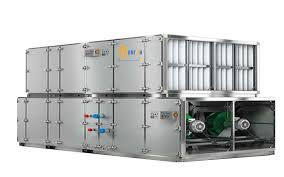Mini Chillers: A Smart Cooling Solution for Modern Projects
- cyruscrafts shop
- Jul 9, 2025
- 4 min read
When it comes to designing reliable, decentralized cooling systems for residential, commercial, or light industrial buildings, mini chillers have become a go-to option for HVAC professionals and project planners. Their compact size, modular design, and high efficiency make them ideal for spaces that require individualized climate control without the complexity of large central chiller plants.
One of the noteworthy systems in this category is the Damatajhiz Mini Chiller, which combines engineering precision with ease of installation, offering a dependable solution for modern building applications in a variety of climates.
What Is a Mini Chiller?
A mini chiller is essentially a smaller version of a conventional air-cooled chiller system. These units typically provide between 3 and 15 tons of refrigeration capacity and are designed for smaller buildings or segments of a project that require dedicated cooling or heating. Unlike central chillers, which serve an entire building from a single engine room, mini chillers are decentralized and often placed on rooftops or terraces, making them highly suitable for independent installations in villas, workshops, luxury apartments, and small office buildings.
Mini chillers function by cooling water in the evaporator section. This chilled water is then circulated via a pump through a network of fan coil units or air handling units inside the building. The process results in distributed cooling across multiple zones, each of which can be individually controlled for maximum comfort.
Where Mini Chillers Excel
Mini chillers provide a middle ground between split AC units and central HVAC systems. They’re particularly beneficial in settings where:
Central engine rooms are not feasible
Zone-based temperature control is needed
Lower noise levels are a requirement
Installation space is limited
Flexible maintenance is preferred
In these situations, systems like the Damatajhiz Mini Chiller are often chosen due to their relatively quiet operation, compact size, and ability to deliver consistent cooling performance even in high-humidity or high-temperature environments.

Key Features to Look For
Modern mini chillers are designed with a wide range of features that improve both user experience and energy efficiency. While specifications vary by brand and model, there are some common attributes that you should consider when evaluating a unit:
Energy efficiency: Look for a COP (Coefficient of Performance) of 3.5 or higher.
Compressor quality: Scroll compressors from trusted manufacturers like Copeland or Danfoss ensure reliability and long life.
Condensers with anti-corrosion coating: Features like Gold Fin or Blue Fin can extend condenser life in coastal or tropical regions.
Smart safety mechanisms: Voltage protectors, flow switches, and antifreeze systems protect the unit from common failures.
Insulation and noise control: Properly insulated evaporators and low-noise condenser fans contribute to efficient, quiet operation.
The Damatajhiz Mini Chiller lineup includes all of these features and more. For instance, the electrical panels are fitted with components from top global brands such as Danfoss (Denmark), Carel (Italy), and Hyundai (South Korea), while the flow control systems ensure safe, smart operation in all conditions.
Installation and Application Scenarios
One of the benefits of mini chillers is the flexibility in installation. Units can be placed on flat rooftops, terraces, or even dedicated platforms adjacent to the building. Because no ductwork is required, the system avoids issues like air leakage, duct noise, or air mixing between different rooms.
In practice, mini chillers are often used in:
Private villas or townhouses
Server rooms or IT facilities
Cafes, shops, and small restaurants
Clinics and laboratories
Modular building projects
The Damatajhiz Mini Chiller, in particular, is equipped to operate in very hot and humid climates, making it a strong candidate for buildings in the Middle East, West Asia, or similar regions.
Capacity Planning and Technical Considerations
Choosing the right capacity is essential for achieving optimal cooling performance and energy savings. An accurate refrigeration load calculation is required, which should take into account:
Local climate and humidity
Orientation and exposure to sunlight
Type of building insulation
Number of occupants and electrical equipment
Usage type of the space (e.g., office, residential, lab)
Mini chillers that are oversized for the application will cycle on and off too frequently, reducing lifespan and efficiency. Conversely, undersized units may struggle during peak heat conditions.
It is generally recommended to consult with HVAC professionals who can analyze architectural drawings and calculate the exact refrigeration load. For instance, Damatajhiz offers technical consultations to assist with sizing and system selection before finalizing the equipment purchase.
Maintenance and Long-Term Use
Compared to large-scale chiller systems, mini chillers are relatively easy to maintain. Access to core components like compressors, evaporators, and control panels is straightforward. Many units include built-in diagnostics and alarms that alert users to issues like flow disruptions, temperature anomalies, or voltage problems.
Additionally, the use of environmentally friendly refrigerants like R407 and R22 (used in Damatajhiz Mini Chillers) aligns with international standards for energy-efficient and sustainable cooling systems.
Final Thoughts
Mini chillers offer a powerful yet compact solution for cooling (and in some cases, heating) needs across a variety of applications. With the right capacity planning, reliable component selection, and a reputable supplier, mini chillers can deliver long-lasting performance while keeping energy bills in check.
Whether you're working on a new construction project or retrofitting an existing space, considering a system like the Damatajhiz Mini Chiller can be a smart and efficient decision—especially when you need performance without the complications of a central HVAC plant.



Comments